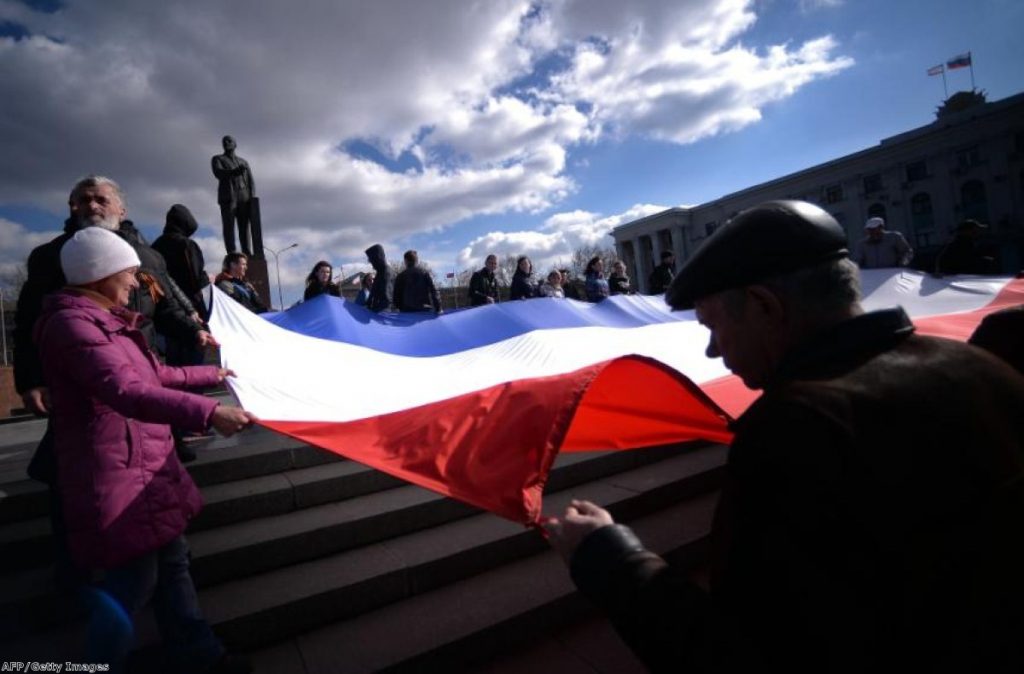A declaration of Cold War: Washington and London turn their backs on Russia
This is how cold wars start. In a fusty, ponderous, poorly-attended Commons debate this afternoon, Britain's MPs began the process of slowly turning their back on Russia for good.
They are not alone. In Washington, the White House was busy confirming G7 leaders will meet on the fringes of a nuclear safety summit in The Hague next week. Around the world it is slowly dawning on political leaders that a new geopolitical era might just be getting underway.
William Hague avoids upping his rhetoric unless he absolutely has to. But this afternoon in the Commons chamber he began talking, for the first time, of what the "long-term consequences" he has made threats about for days actually mean in practice.
It turns out 'long-term consequences' means 'long-term cold war'.


The world Hague outlined was one "in which decisions are accelerated to reduce European independence on Russian energy exports, foreign policy would play a bigger role in energy policy, in which Russia would have less influence in Europe and European nations would do more to guard against the flagrant violations of international law we have seen in Crimea in recent weeks from being repeated".
The MPs who had bothered to turn up – and in truth there were not that many of them – listened calmly to what amounted to a declaration of cold war against Russia. More should have been present, in truth. When military interventions are considered, as with Syria, the Commons is packed with hand-wringing parliamentarians. When a grimmer slow-motion diplomatic collapse takes place, the imaginations of most backbenchers failed to fire.
Hague added: "This is not the relationship we have wanted with Russia or have sought with Russia. But it is the relationship which Russia's actions look like they will force us to adopt."
The foreign secretary is playing catch-up with his shadow foreign secretary Douglas Alexander, who has been calling for Britain to demand Russia's immediate suspension from the G8.
He did not talk about a move to kick Russia out of the group outright, but did discuss a world "in which institutions such as the G8 work without Russia". Alexander said this comment was "intriguing"; he wanted to know what Hague was actually getting at. But the foreign secretary didn't need to clarify his point by saying 'we'll just start talking about the G7 instead'. Not when, at the same time across the Atlantic, Barack Obama's aides were outlining the US president's plans to rally the rest of the world's leading powers against Vladimir Putin.
Alexander, who had raced ahead so far ahead of Hague he was in danger of breaking step with the government altogether, was at pains today to agree with the Foreign Office's approach. He can afford to do so because Hague, pushed by Putin's uncompromising position, has moved instead. "This is a huge geopolitical moment," Alexander said. In the drowsy Commons atmosphere that sounded like hyperbole, when it was nothing of the kind.
Now Alexander's team must decide whether to continue their call for a Russian suspension of the G8. The Foreign Office's preferred approach seems to ignore it altogether, concentrating instead on anti-Russian talks in the G7. Making institutional moves in the G8 risks looking like semantics – after all, the G8 minus one country is, according to maths, the G7. But there might be a case for pushing ahead with a G8 suspension on the grounds it would humiliate Russia.
"These moments test us as an international community," Alexander added. It seems Labour believes the world is meeting the test. "One of the shafts of light in the darkness is the degree of cooperation between the European Union leaders and the US secretary of state John Kerry," he pointed out.
The stench of appeasement lingered in the Commons chamber this afternoon. MPs debating the Crimea crisis weren't prepared to namecheck the Nazis directly – at best they allowed themselves to allude to "the events of the 1930s" – but it was clear they are starting to think about Vladimir Putin as the next Adolf Hitler.
Britain's parliamentarians spent the afternoon worrying again and again about the welfare of the other countries on the hinterlands of Europe – Belorussia, Estonia, Moldova, Lithuania, Latvia. These states, in the minds of the armchair diplomats watching the crisis unfold from their offices in London's parliament, are in dire danger. "We've had a relatively weak response from the western world," Conservative MP James Wharton said. "This is not a good place to be. We are not going to stop a bully… with weak actions towards him."
It is a myth that inside every provincial politician a statesman is waiting to get out. Most like to specialise in some obscure area of public policy. Few like to engage on the grand scale of global diplomacy. And that showed in this debate. A few were passionate advocates of action. Others looked as bewildered and hapless as the rest of us feel when confronted with such big-picture headaches.
"Over the last four years we've looked to improve relations with Russia… but there's no doubt if there's no progress with Ukraine, relations between Russia and many other countries in the world will be permanently affected in this way," Hague declared at the end of his speech.
"Russia should be clear about the long-term consequences, and in the United Kingdom we will not shy away from those consequences."
MPs blinked, scratched themselves, shifted in their seats. Um, they seemed to ask themselves, is something big happening?












